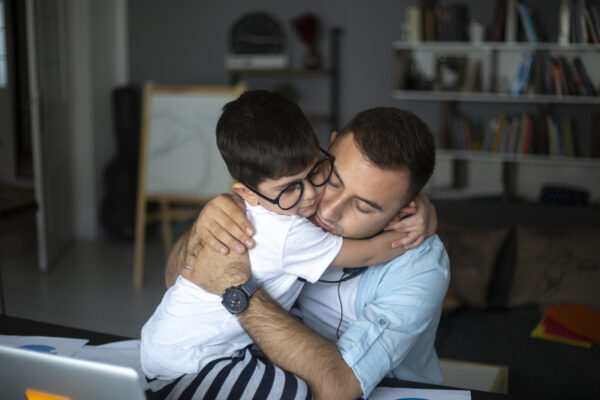 Two years into the COVID-19 pandemic and parents and kids alike are still reeling from the unexpected disruptions. While many parts of our lives are returning to some normalcy, we still haven’t gotten back to our baseline normal — and that can be stressful.
Two years into the COVID-19 pandemic and parents and kids alike are still reeling from the unexpected disruptions. While many parts of our lives are returning to some normalcy, we still haven’t gotten back to our baseline normal — and that can be stressful.
The pandemic’s lingering effects are creating anxiety in our children. Constant concern about immunocompromised and elderly loves ones getting sick, school and extracurricular disruptions, separation from friends due to quarantine and increased use in social media all feed into anxiety.
“What kids are going through we could equate to posttraumatic stress disorder,” said Dr. Therese Linnon, a pediatrician at Akron Children’s Pediatrics, Warren. “They have missed out on nearly 2 years of normalcy. Instead, they have suffered a constant state of uncertainty and fear, in some cases, loss of major milestones and favorite pastimes.”
It’s a national problem, where the number of children and teens seeking help for anxiety and depression continues to rise. A recent study from the Centers for Disease Control and Prevention found kids aged 5-11 seeking mental health care at emergency departments in 2020 increased by 24 percent from 2019. For teens 12-17, that number increased 31 percent over the previous year.
It’s clear our kids are suffering much in the same way that adults have. Dr. Linnon shares common warning signs children are suffering from anxiety and how we as parents can help them cope in the midst of an ongoing pandemic.
Anxiety warning signs in kids
Common warning signs that your child may be suffering from anxiety include:
- Withdrawing from family and peer relationships
- A loss of interest in activities or hobbies once enjoyed
- Abrupt changes in mood
- A hard time falling asleep or staying asleep, or sleeping all the time
- Abrupt changes in appetite, such as eating more often or never being hungry
- Decrease in academic effort
- Increase in risky behavior, such as substance abuse
- Suicidal thoughts or behaviors
Anxiety also can present as physical symptoms, such as an upset stomach, headache, nausea, vomiting and diarrhea.
“In uncertain times, it’s normal for kids to experience anxiety at one time or another,” said Dr. Linnon. “But once behavior starts to interfere with daily functioning, it’s time to seek professional help.”

One of the best ways to help kids overcome anxiety is to foster resilience now.
How parents can help kids ease anxiety
One of the best ways to help kids overcome anxiety is to foster resilience. Resilience teaches kids the skills to cope, how to recover from hardships with confidence and better prepares them for future challenges.
“It’s easy to point to the pandemic as the problem,” said Dr. Linnon. “But if it wasn’t a pandemic, it would be something else, such as divorce, a death in the family or natural disaster. Teach them now the skills to overcome any obstacle life throws at them.”
She offers 7 ways to build resilience and help your kids cope with the pandemic:
- Stay calm. Be the calming, stable force for your children, even when you’re stressed out. You can address your worries and fears with your partner or other adults away from your children.
- Answer questions honestly. Be open and honest with your children when answering their questions about the pandemic. Tell them what you know and admit what you don’t.
- Address fears. Reassure your kids it’s OK to be scared and that you are there for them. Conveying a sense of connection is important for their well-being.
- Teach kids to let go of things they can’t control. Teach your kids to let go of the things they can’t control and instead, keep the focus on what they can control, such as masking, frequent hand washing and social distancing.
- Recognize their feelings and model how to manage them. Offer empathy when your children are upset or worried to illustrate you understand their point of view. Also, teach your kids that emotions are good and talking about them is necessary for healing.
- Maintain your children’s physical health. Strong bodies support strong minds. Encourage a balanced diet and regular physical activity.
- Maintain personal relationships. Keeping relationships with peers and family strengthens your children and helps them keep a sense of normalcy.
How your child’s pediatrician can help
Staying in touch with your child’s pediatrician is more important than ever during this pandemic.
“If you have concerns about your child’s social or emotional health or if you notice an increase in warning signs, such as extreme mood changes or abrupt changes in sleeping or eating patterns, reach out to her pediatrician,” said Dr. Linnon. “We can screen for anxiety and depression, offer ways to help your child cope and refer for further professional help, if necessary.”
Get to know Akron Children’s pediatric providers and schedule an appointment by calling 330-543-2778 if you think your child is suffering from anxiety.










